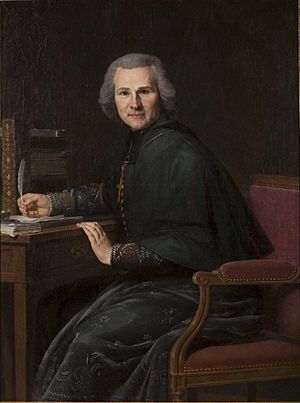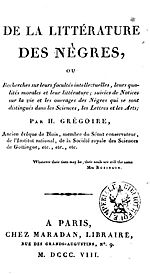Henri Grégoire facts for kids
Quick facts for kids
Henri Grégoire
|
|
|---|---|

Portrait by Joseph François, 1800
|
|
| 5th President of the National Convention | |
| In office 8 August 1793 – 22 August 1793 |
|
| Preceded by | Marie-Jean Hérault de Séchelles |
| Succeeded by | Bertrand Barère de Vieuzac |
| Member of the Chamber of Deputies for Isère |
|
| In office 11 September 1819 – 4 November 1820 |
|
| Succeeded by | Auguste Ravez |
| Constituency | Unknown |
| Member of the Conservative Senate | |
| In office 25 December 1801 – 11 April 1814 |
|
| Monarch | Napoleon I |
| Preceded by | Aaron Jean François Crassous |
| Succeeded by | Office abolished |
| Member of the Legislative Body for Loir-et-Cher |
|
| In office 25 December 1800 – 25 December 1801 |
|
| Constituency | Blois |
| Member of the Council of Five Hundred for Loir-et-Cher |
|
| In office 2 November 1795 – 10 November 1799 |
|
| Constituency | Blois |
| Member of the National Convention for Loir-et-Cher |
|
| In office 20 September 1792 – 2 November 1795 |
|
| Constituency | Blois |
| Member of the National Constituent Assembly | |
| In office 9 July 1789 – 30 September 1791 |
|
| Constituency | Nancy |
| Member of the Estates-General for the First Estate |
|
| In office 13 June 1789 – 9 July 1789 |
|
| Constituency | Nancy |
| Personal details | |
| Born |
Henri Jean-Baptiste Grégoire
4 December 1750 Vého, near Lunéville, France |
| Died | 28 May 1831 (aged 80) Paris, France |
| Resting place | Panthéon, Paris |
| Political party | Left Group (1789–1791) Marais (1792–1795) Thermidorian (1795–1799) Anti-Bonapartist (1799–1814) Liberal Left (1819–1820) |
| Alma mater | University of Nancy |
| Profession | Clergyman |
| Awards | Commander of the Legion of Honor |
| Signature |  |
Henri Jean-Baptiste Grégoire (born December 4, 1750 – died May 28, 1831) was a French Catholic priest and an important leader during the French Revolution. He was often called the Abbé Grégoire. He strongly believed in ending slavery and supported the idea that everyone should have the right to vote. He also helped create important French institutions like the Bureau des longitudes (which deals with time and geography) and the Institut de France (a group of learned societies).
Contents
Early Life and Education
Henri Grégoire was born in Vého, a small town near Lunéville, France. His father was a tailor. He studied at a Jesuit college in Nancy. In 1782, he became a parish priest (called a curé) in Emberménil.
Grégoire was recognized for his writing even before the Revolution. In 1783, he won an award from the Academy of Nancy for his essay on poetry. In 1788, he won another award from the Academy of Metz for an essay about improving the lives of Jewish people.
In 1789, the clergy (church leaders) of Nancy chose him to represent them at the Estates-General of 1789. This was a big meeting called by the King to discuss France's problems. Grégoire quickly became known as someone who supported the Revolution. He was one of the first church leaders to join the Third Estate (the common people's representatives). This helped unite the different groups in the Estates-General. He spoke strongly against those who opposed the new ideas of the Revolution. He also played a key role in ending the special rights of the nobility and the Church.
Career and Contributions
A Revolutionary Bishop
After the Revolution, a new law called the Civil Constitution of the Clergy changed how the Church worked in France. Grégoire was the first priest to agree to this new law in December 1790. He was then chosen as a bishop for the Loir-et-Cher area. He took the old title of bishop of Blois. For ten years, from 1791 to 1801, he led his diocese with great dedication.
Grégoire was a strong supporter of the new French Republic. In September 1792, he famously said, "Kings are in morality what monsters are in the world of nature." He demanded that King Louis XVI be put on trial. He was even elected president of the National Convention (the new government) and led meetings while wearing his bishop's clothes. During the King's trial, Grégoire urged that the King be found guilty. However, he also suggested that the death penalty should not be carried out.
In November 1793, during a very dangerous time called the Reign of Terror, many church leaders were forced to give up their positions. Grégoire bravely refused to give up his religion or his office. This act of courage likely saved him from being executed. He continued to wear his bishop's clothes in public and held daily Mass at his home. He was also the first to argue for reopening churches in December 1794.
Grégoire also came up with the word "vandalism". He used it to describe the destruction of property that happened during the Revolution. He believed that artworks, buildings, books, and old writings should be protected. He is seen as one of the first people to promote the idea of preserving cultural objects.
Unifying the French Language
Abbé Grégoire is also known for wanting a single national language for France. In 1794, he wrote a report called Report on the necessity and means to annihilate the patois and to universalise the use of the French language. In this report, he explained that most people in France spoke one of 33 different local dialects or patois. He argued that French should be taught everywhere, and other dialects should be stopped.
Grégoire himself grew up speaking the Lorrain "patois." He believed that the many different languages in France had been used by the nobility to keep people separated. He thought that having one language would help all French citizens understand and use their rights better. His ideas helped start a process that led to fewer regional languages being spoken in France over time.
Champion of Equality
Fighting for Racial Equality
In October 1789, Grégoire became very interested in ending slavery. He met Julien Raimond, a free man of color from a French colony, who wanted to represent his group in the government. Grégoire wrote many pamphlets and books about racial equality. He became an important member of the Society of the Friends of the Blacks, a group that was considered very radical at the time.
As a member of the National Assembly, Grégoire supported ending slavery in France. He also worked to give free people of color in French colonies the same rights as white people. In May 1791, thanks to his efforts, the government passed a law giving some wealthy free men of color equal rights. He was also recognized for his book De la littérature des Nègres (On the Literature of Black People). This book showed readers that Black people were equal to whites in every way, including their intelligence.
Supporting Jewish Equality
Grégoire was also known as a friend of the Jewish people. He argued that any problems or difficulties faced by Jewish people in French society were not because of who they were. Instead, he believed these problems came from how they had been treated. He blamed their persecution by Christians and some of their religious teachings. He thought that Jewish people could become full citizens and join mainstream society.
Later Political Life
After 1795, Grégoire was elected to the Council of Five Hundred, another part of the French government. He and his colleagues opposed Napoleon Bonaparte's takeover of power in 1799. They warned that this takeover would make France go back to the way it was before the Revolution.
Even though he opposed Napoleon, Grégoire became a member of the French Senate in 1801. He disagreed with Napoleon's decision to make peace with the Pope. He was one of only five senators who voted against Napoleon becoming Emperor of France. He also opposed Napoleon creating a new nobility and divorcing his wife. Despite his opposition, he was still given the title of Count and became an officer of the Legion of Honor.
In 1814, after Napoleon's rule ended, Grégoire returned to France. He wrote a book about the new French constitution from a liberal point of view. In 1819, he was elected to the Lower Chamber of the government. However, the King, Louis XVIII, and other European powers saw this as a problem. To avoid more trouble, the King decided to cancel Grégoire's election.
After the royal family returned to power, Grégoire was still important. But as a revolutionary and a bishop who had supported the new church laws, royalists disliked him. He was removed from the Institut de France. From then on, he lived a quiet life, focusing on writing and corresponding with other thinkers in Europe. He even had to sell his library to support himself.
Death and Legacy
Henri Grégoire always considered himself a devoted Catholic, even with his revolutionary ideas. When he was dying in 1831, he wanted to receive the Church's last sacraments. However, the Archbishop of Paris refused unless Grégoire took back his oath to the Civil Constitution of the Clergy. Grégoire refused to do this.
Despite the Archbishop's refusal, other priests gave Grégoire the sacraments. His death caused a stir in Paris. The government even sent troops to prevent riots during his funeral. His funeral was a large event, with about 20,000 people following his coffin. Students even pulled his hearse to the cemetery.
On December 12, 1989, Grégoire's ashes were moved to the Panthéon in Paris. This is a special resting place for famous French people. The President of France, François Mitterrand, led the ceremony. This showed that Grégoire's contributions to France were finally fully recognized.
See also
 In Spanish: Henri Grégoire para niños
In Spanish: Henri Grégoire para niños


